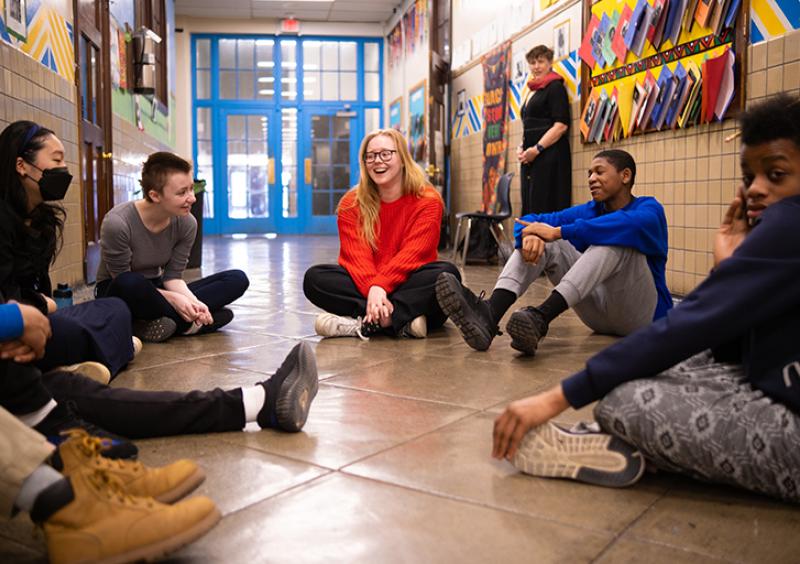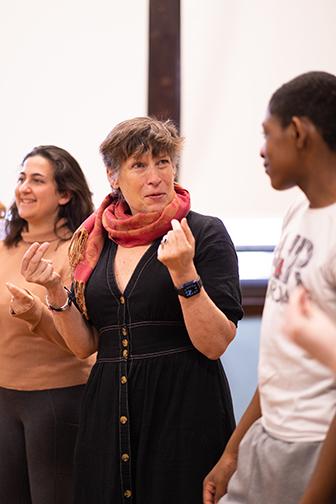
What does Antigone, a play written 2,500 years ago, have to offer a classroom of middle schoolers? Plenty, according to Bryn Mawr associate professor of theater Catharine Slusar.
“I think that we have preconceived notions of what a seventh grader from South Philadelphia should be interested in,” says Slusar, who is leading a Praxis class this spring called Art: Spaces of Possibility in which Bryn Mawr and Haverford students visit the E.M. Stanton School in Southwest Philadelphia once a week to collaborate with students. “Antigone was a teenager, and she committed an act of civil disobedience,” Slusar notes. “So we ask ourselves, ‘How is that something that's exciting for us to think about? How does that resonate with our own lives?’”
Slusar has been partnering with Stanton for almost two decades through a series of artist residencies. She brought the connection with her when she joined the Bryn Mawr faculty and created a class where Bi-Co students can learn to foster creative intergenerational partnerships rooted in shared purpose. “It's this idea of moving away from what Paulo Freire calls ‘the banking system of education,’ where you are making deposits into brains, and instead using this idea that we're all learning together as partners,” she says.
After a two-year hiatus due to the pandemic, Slusar is excited to have the class back up and running, this time as part of Greek Drama/Black Lives, a yearlong collaboration sponsored by the Theater and Classics Departments at Bryn Mawr (funded by a grant from the American Council of Learned Societies) that aims to shine a light on what we can learn today from the classics, using theater as the field for discovery.
Greek Drama/Black Lives also includes the staging (by Community College of Philadelphia and Bi-Co students) of an adaptation of Medea by Pulitzer-prize winning playwright James Ijames, a playwriting class, and a graduate seminar.
To underscore the shared nature of the learning, the seventh graders make many of the decisions about the scenes from Antigone that they perform in class. “The students can be in it, direct it, make us be in it, whatever they want,” says Bryn Mawr junior Bethany Wisdom. “We're stepping into this experience and creating it together.”
“I think we underestimate the importance of the arts in education. This is learning using a different lens and what we find consistently is that there are students who get caught for the very first time in the thrill of learning and in the thrill of curiosities they didn't even know they had.” — Catharine Slusar
Slusar helps prepare her college students for the potentially intimidating prospect of working with middle schoolers by talking about her own experiences. “I always tell them that when I first started this work, it felt simultaneously like the most important, most difficult, and most rewarding work that I did. I would sometimes leave the classroom sobbing because it was so hard, but I also would sometimes leave walking on cloud nine because what was accomplished was so exciting.”
She also asks the college students to think about the best and worst of seventh grade in their own experience. When did they learn and when were they checked out? When were they excited and when were they withdrawn?
“One thing that helps is that no student is on their own,” she says. “They always have a partner and they’re working with a small group of eight students as opposed to 30, which is a huge advantage.”
Bryn Mawr Praxis coordinator Tiffany Stahl, who has sat in on the classes, notes how well prepared the Bryn Mawr and Haverford students have been and how they have built bridges and made meaningful connections through “two hours of joy, patience, and fresh perspectives with a generation of kids who are navigating the multitude of challenges of a post-pandemic world.”
The Bi-Co cohort, she says, “embody contagious passion, which shows through their creative lesson plan development, thoughtful interactive games that capture the attention of the middle school mind, and dynamic ice breakers that break down awkward internal barriers.”
Stahl likens the intergenerational growth she sees happening at Stanton to a “metamorphosis of self,” with the middle schoolers recognizing talents in themselves they never acknowledged or knew they possessed and the college students gaining in confidence, developing creative autonomy, and cultivating deeper relationships with the seventh graders.
“I think we underestimate the importance of the arts in education,” adds Slusar. “This is learning using a different lens and what we find consistently is that there are students who get caught for the very first time in the thrill of learning and in the thrill of curiosities they didn't even know they had.”
As the class draws to an end in May, the Stanton students will travel to Bryn Mawr’s campus for a busy day that will include a lighting workshop run by the technical theater staff, a brief performance by the seventh graders and their Bi-Co partners, and lunch at Erdman. “We spend a lot of time telling young people that they should want to go to college, they need to go to college,” says Slusar, “and for some kids, this is their first chance to actually be on a college campus.”
For Wisdom, the opportunity to work with Stanton’s tweens and early teens has been invaluable. Having taken classes in Bryn Mawr’s education department, she had learned about the philosophy of learning together rather than simply entering a classroom and bestowing wisdom and that approach had appealed to her because of the “freedom and life and excitement that can be brought into education that way.”
Visiting Stanton every week, she was able to start putting those ideas into practice. “That's what this class is already teaching me,” she says. “And I'm really excited about the chance to pick up those skills.”
More on Greek Drama/Black Lives
- Media/Medea: Staging a Modern Greek Tragedy
- Playwriting Class Puts Mythology on Center Stage
- Graduate Seminar Class Brings Ancient Texts to Life
- Pulitzer-Winning Playwright Visits Campus to Discuss 'Medea' Collaboration
- "Media/Medea" Theater Program Page
- Faculty Members Catherine Conybeare and Catharine Slusar Receive ACLS Grant
Media/Medea on Stage
James Ijames’ Media/Medea will be directed by internationally recognized director and founder of local Philadelphia company Azuka Theatre, Raelle Myrick-Hodges, and will feature Barrymore Award and Haas Award winning actor Akeem Davis working alongside student actors from Bryn Mawr College, Haverford College, and Community College of Philadelphia.
Performances will take place:
April 13–16: Bryn Mawr College, Hepburn Teaching Theater
April 20–22: Black Box Theater, Community College of Philadelphia
Community College of Philadelphia Tickets Coming Soon!
.
